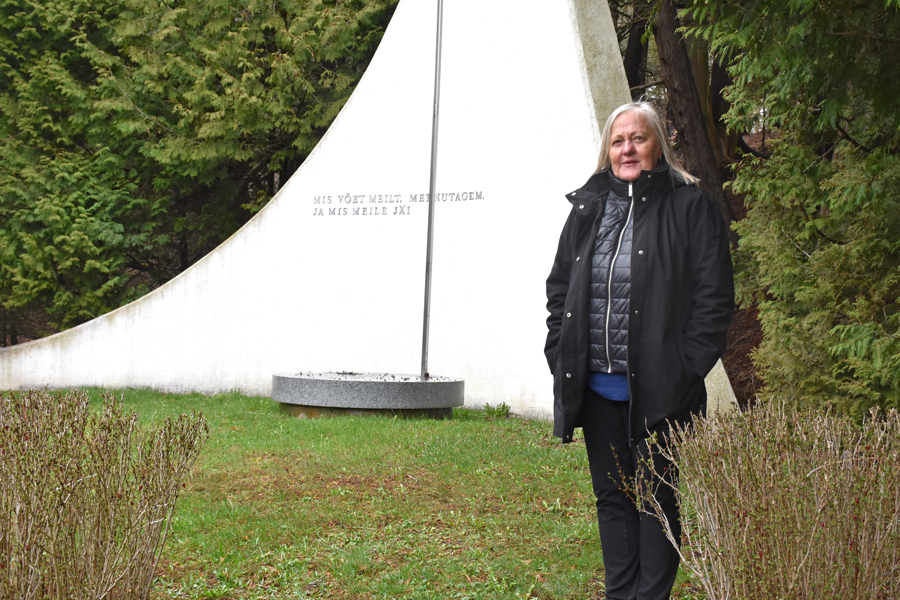ELORA – You might have driven past it dozens of times and not known it’s there. But off the 8th Line just outside Elora, around a bend and down a laneway, is a magical place.
And it’s here, at 6338 8th Line, where the local Estonian community is preparing for its Song Festival – an event that happens every four years.
Along with choirs from all over Ontario and the U.S., the festival is bringing in two professional choirs from Estonia: Tartu RahvaÜlikooli Segakoor (the Tartu Folk Post Secondary Mixed Choir under the direction of Lauri Breede) and Eesti Rahvusringhäälingu Segakoor (the Estonian National Public Mixed Choir under director Hirvo Surra).
The festival takes place June 28 to 30, and while that may be Canada’s birthday weekend, Estonian-Canadians will enjoy an important piece of their own culture.
The Song Festival is a tradition that began in 1869 in Tartu, Estonia and became enormously popular in that country as a way to celebrate its language and heritage through singing.
“We also celebrate the longest day of the year. It’s our tradition to light fires, sing and dance and celebrate,” said Lia Hess, an event organizer. “We will bring that tradition too.”
Estonia’s history is fraught with conflict, invasion and occupation – by Russia, Nazi Germany, and the U.S.S.R.
During many periods in that history, it was illegal to speak Estonian or exercise its cultural practices.
In the 1940s and ’50s, many Estonians fled their country when Stalin invaded, and a large number of refugees came to Canada with the hope it wouldn’t be too long before they could return home.
Many formed Estonian societies, where they could come together and teach their children Estonian language and customs, so their children would not be behind at school when they were able to return.
Four of those societies – around London, St. Catharines, Hamilton and Kitchener – pooled their resources and in 1955 they purchased land outside Elora to build a place to come together and continue their Estonian practices.
They called it Seedrioru – Cedar Vale – a beautiful, 66-acre property on 8th Line and the banks of the Grand River near the Wilson Flats.
It would be the perfect place to hold summer camps for kids, social events for adults, and the ever-important song festivals.
On a drizzly weekend in April, folks from those four societies were on the site to clean up debris from the winter, repair fences, clean the cabins and get the place ready for summer.
There are 50 cottages on the land that are leased to Seedrioru members as vacation spots.
There is also a clubhouse with a kitchen and social space, cabins for summer camps, a swimming hole, shooting range, walking trails, open space for games and camping, and a stage for the Song Festival.
It’s a beautiful property and for many of its members, it has been a second home most of their lives.
“We’re fifth generation here now,” Hess explained on a tour of the property.
“My husband came to camp here in the 1960s. And now we bought a cottage here ourselves.”
Leasing the 50 cottages on the property covers taxes and communal expenses, Hess said.

Lia Hess, a volunteer at Seedrioru, stands in front of a monument on the property in memory of those who died for the freedom and independence Estonia now enjoys. Photo by Joanne Shutleworth
Summer camp admission fees cover the cost of events. An army of volunteers do the work required to maintain the property.
Some 80 young campers, ranging from ages four to 16, attend camp for two-week stints over four weeks of the summer.
Older children do survival training and target shooting at the shooting range on their adventure week. Younger children have supervised swims, games, songs, stories and more.
Language and cultural learning are central to the camps for all ages.
Estonia declared its independence in 1991 but by then some Estonian-Canadians had been here for 50 years.
“Our graves are here (in Canada). That keeps us here,” Hess said.
“But we still want to preserve our heritage.”
One of the big features of the song festival in Estonia is that all the participating choirs learn the same song and sing it together – some 25,000 voices singing the same song in a dramatic and emotional performance.
That will happen at Seedrioru too, Hess said, although the numbers will be smaller. They are expecting about 500 visitors to the site on the long weekend.
Seedrioru has held the Song Festival every four years since 2008.
The event is open to the wider community, Hess said, and there’s room to camp for those who want to spend the entire weekend.
June 29 is the festival proper, where choirs will sing and there will be a commemorative ceremony by a monument on the site.
Alongside the music program will be beach volleyball and chess tournaments.
Hess called the Sunday program “bonus day.”
“In the afternoon, that’s when everybody sings together,” she said.
Children are an important part of the program. They lead the parade that opens the event, and they sing in youth choirs.
“The Song Festival has to include kids,” Hess said. “They are the future.”
Hess said there are about 1 million Estonians who were displaced to other parts of the world during a time when it was illegal for them to speak their language or follow their customs in their own country.
A monument on the site stands as a reminder “of what was taken from us, but also what we have,” she continued.
“We’re here because we were forced here. But we also know we are extremely lucky to be here in this little pocket in Elora.”
Tickets for the music festival are $60 per person and include Saturday dinner and Sunday lunch.
For more information visit seedrioru.com.



